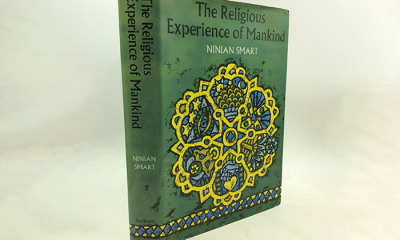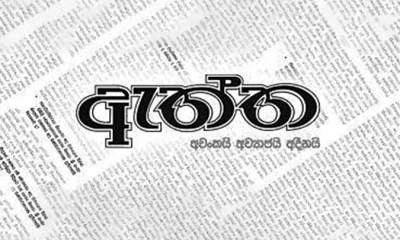Editorial
A question of vision

Monday 12th June, 2023
Hardly a day passes without an instance of cruelty to animals being reported in Sri Lanka, whose political leaders make a public display of their knowledge of Buddhism, and perhaps preach more Dhamma than even the members of the Maha Sangha. Despite their sanctimonious pretences, this predominantly Buddhist country seems to have become a hell on earth for poor animals, especially elephants, which undergo immense suffering at some Buddhist temples themselves and other places of worship besides invading villages due to the disappearance of their natural habitats and dying violent deaths at the hands of farmers as a result.
It is said that one of the first few things Arahant Mahinda did after arriving here to introduce Buddhism was to save a deer by distracting and stopping King Devanampityatissa, who was pursuing the terrified creature. But today many sins are committed against animals in this country; close on the heels of the exposure of the plight of an elephant, gifted by Thailand, which is said to be planning to fly the poor animal back home for treatment, and rightly so, has come a disturbing report that a she-elephant, named Lasanda, being kept at Vishnu Devale, Devinuwara, is losing sight in one eye as her ocular condition has been neglected for a long time. Will the Davale official care to respond to this very serious allegation?
It has been reported that Lasanda was donated to the Devinuwara Davale, years ago, by the then President Mahinda Rajapaksa. The deplorable practice of animals being gifted or exchanged, according to the whims and fancies of government leaders or others must be ended. Rajapaksa is known to be fiercely protective of his children, and does not brook even any mild criticism of them, but he as the President had no qualms about having baby elephants snatched from their mothers at the Pinnawala elephant orphanage, even before they were weaned, and gifting them to places of worships, etc. He however is not alone in having used elephants as gifts. Many Sri Lankan leaders have earned notoriety for doing so.
A video telecast by Hiru TV shows Lasanda being taken to a polluted pond for bathing, and she is likely to contract waterborne diseases as well. Animal rights activists fear that the dirty water she is made to bathe in might worsen her eye condition. The pond has to be cleaned regularly.
Lasanda’s predicament has been another blot on Devinuwara Devale’s reputation. About five years ago, the media exposed the suffering of an elephant at the same Devale. Named Kalana, it had chain-inflicted wounds on its legs; they were badly infected because they had not been treated for a long time. Luckily, adverse media reports shook the authorities concerned awake and Kalana was taken elsewhere for treatment immediately. It defies comprehension why religious places are allowed to keep elephants, which they cannot take good care of.
One can only hope that the state institutions maintained with public funds to promote animal welfare will rise from their slumber and do their bit to ensure that Lasanda receives proper treatment, and her eye is saved. First of all, she must be removed from the Devinuwara Davale premises forthwith to a place where she receives medical attention and has access to clean water. The Devale officials, their mahouts and all others responsible for looking after the animal must be made to explain their failure to have her treated all these years, and the possibility of legal action being instituted against them should be explored. Nobody should be allowed to inflict suffering on animals in the name of religion or culture, and the need for a probe into Lasanda’s plight cannot be overemphasised.
Editorial
Transparency compromised

Monday 7th April, 2025
Indian Prime Minister Narendra Modi’s Sri Lanka visit saw the signing of seven MoUs between New Delhi and Colombo. Prominent among them are the MoU on the implementation of HVDC Interconnection for import/export of power, the MoU on cooperation among the governments of India, Sri Lanka, and the United Arab Emirates on developing Trincomalee as an energy hub, and the MoU on defence cooperation between India and Sri Lanka.
The signing of those MoUs, especially the one on defence cooperation, on 05 April, is a textbook example of irony. The significance of that day may not have been lost on keen political observers. The JVP, which leads the ruling NPP coalition, launched its first abortive insurrection on 05 April 1971, and one of the five classes it held to indoctrinate its new recruits, before sending them on a suicidal mission, was on Indian expansionism.
There is no gainsaying that Sri Lanka must not allow its land, sea and airspace to be used against India in any manner—or against any other nation for that matter. President J. R. Jayewardene, in his wisdom, got too close to the US in a bipolar world, and antagonised India in the process. He had the scourge of separatist terror and the Indo-Lanka Accord to contend with. The JVP went all out to scuttle the implementation of that accord, albeit in vain. The US and India have closed ranks today in a bid to thwart China’s rise, and a government led by the JVP has signed an MoU with India on defence cooperation!
The NPP government has violated one of the fundamental tenets of good governance––transparency. There has been no transparency about the aforesaid MoUs, especially the one on defence cooperation.
When the JVP/NPP was in the Opposition, it would flay governments for signing vital MoUs and pacts without transparency. It has kept Parliament in the dark about the MoUs in question. It is apparently emulating its bete noire, Ranil Wickremesinghe, not only in managing the economy but also signing vital MoUs!
India has demonstrated its ability to render Sri Lankan political parties malleable. PM Modi can justifiably pat himself on the back for having tamed the once anti-Indian JVP, which unleashed brutal violence purportedly to extricate Sri Lanka from what it described as India’s tentacles, in the late 1980s.
In 2024, the Modi government gave a diplomatic leg-up to the JVP/NPP, enabling its rise in national politics as a political party with some international recognition, and boosting its chances of winning elections. There is reason to believe that the JVP-led NPP would not have been able to win any parliamentary seats in the North and the East if it had not been in the good books of India. Interestingly, in October 2015, Dissanayake himself stated in Parliament that Jaffna had become a den of RAW spies. “They attempt to create political instability in Jaffna and we should put a stop to it,” he said. Today, the JVP is at India’s beck and call! In 2021, the then former MP Dr. Nalinda Jayatissa, who had been a member of the Parliamentary Select Committee that probed the Eastern Sunday terror attacks (2019), told BBC that he believed India had been behind the carnage, and his conclusion was based on ‘investigative evidence’. Dr. Jayatissa is the incumbent Media Minister. The JVP/NPP no longer inveighs against India for what it accused the latter of, in the past. Worryingly, its government stands accused of having blocked local media out of some key events related to PM Modi’s Sri Lanka visit over the weekend.
It is toe-curling to see some JVP leaders who resorted to mindless terror in a bid to scuttle the signing of the Indo-Lanka Accord , in 1987, going all out to justify the inking of an MoU on defence cooperation between their government and India, more than three and a half decades later. The signing of that particular MoU marked the JVP’s biggest-ever Machiavellian U-turn. If it had refrained from unleashing terror in 1987, tens of thousands of lives and state assets worth billions of US dollars could have been saved. Most of all, how would the JVP have reacted if a previous government had entered into MoUs with India?
Editorial
Bottom trawling: Right and Might

Indian Prime Minister Narndra Modi’s three-day visit here was predictably heralded by a blaze of publicity in the local press and electronic media. This was no cause for surprise given that good relations with our giant neighbour, or Big Brother as some would prefer to style it, must remain the cornerstone of Sri Lanka’s foreign policy. New Delhi accurately judged in which direction the political winds were blowing well ahead of last year’s presidential and parliamentary elections and invited the soon to be President Anura Kumara Dissanayake to visit India where he was well received. Weeks after being elected president, and scoring a better than two thirds majority in the parliamentary election that followed shortly thereafter, Dissanayake paid a state visit to India, his very first after being elected and was very warmly welcomed.
Prime Minister Modi is now here on a reciprocal visit and has a crowded agenda including a visit to Anuradhapura where he will pay homage to the sacred Jaya Sri Maha Bodhiya, grown from a sapling of the bo tree in India under which the Buddha attained enlightenment; and formally inaugurate the Maho-Anuradhapura railway signaling system and the newly upgraded Maho-Omanthai railway line, both assisted by India. Several memorandums of understanding, including possibly a Defence Co-operation Agreement, kept under wraps at the time of writing this comment, are due to be exchanged. Official word on the subject is that matters to be covered in the MOUs include energy, digitization, security and healthcare along with agreements relating to India’s debt restructuring assistance. But no details have been forthcoming.
Additionally, the visiting prime minister and his delegation who will have bilateral discussions with Sri Lanka’s president is also due to virtually inaugurate several India assisted projects. These include the Sampur solar power plant, the 5,000 mt temperature and humidity controlled cold storage facility in Dambulla and the installation of 5,000 solar panels across 5,000 religious sites here. Sri Lanka cannot forget the massive assistance provided by India in 2022 when this country faced the worst economic crisis in its contemporary history. At that time India provided multi-pronged assistance, including a $4 billion financing package through multiple credit lines and currency support, to help this country sustain essential imports and avoid defaulting on its debts.
Sri Lanka is undoubtedly benefiting from great power rivalry between India and China in the Indian Ocean where India seeks advantages through its Neighbourhood First policy while China seeks leverage through its Belt and Road initiative. The fact that the new Sri Lanka president chose to make his first state visit to India and thereafter follow with a visit to China may be an indication of priorities in Colombo. There is no escaping the reality that all countries must, where foreign relations are concerned, place their own national interest above all other considerations. This is so be it for Sri Lanka, India, China or any other country. Thus while not looking gift horses in the mouth, we must always be conscious that there is no such thing as a free lunch and be protective of our own interests.
Relations between Sri Lanka and India saw both high and low points during this century. The low was during the civil war Sri Lanka waged against the Liberation Tigers of Tamil Eelam (LTTE) in the earlier stages of which India allowed the insurgents to train and base on Indian territory. India, in fact, provided them with weapons and military training and other assistance through its RAW (Research and Analysis Wing). state intelligence agency. It may be argued that the communal disharmony between the Sinhalese and the Tamils that escalated into civil war was a problem of Sri Lanka’s own making and sub-regional sentiment in Tamil Nadu greatly influenced New Delhi’s hand in intervening.
Relations thereby plummeted and were restored to a point by the signing the Indo- Sri Lanka Peace Accord between President J.R. Jayewardene and Prime Minister Rajiv Gandhi in July 1987. With two insurrections raging in the north and south of the country, Jayewardene had no option but seek Indian assistance on India’s terms. What followed including Rajiv Gandhi’s assassination, as he campaigned for re-election as India’s prime minister is contemporary history that requires no elaboration. But since then, in the post 2022 situation when Sri Lanka faced an unprecedented economic crisis and was forced to declare bankruptcy, India came to our rescue with massive assistance and relations between the two countries have never been better.
At this point of time when Sri Lanka is headed in a new political direction under new leadership, will it be possible for the greatest irritant in present Indo-Lanka relations – bottom trawling by Indian fishermen poaching in Sri Lanka waters and destroying the marine environment – to be conclusively resolved? India has always adopted the position that this issue must be resolved in what she calls a “humanitarian manner.” It is undoubtedly a livelihood issue for fishermen – on both sides. Indian fishermen enjoyed free rein on the Sri Lanka side of the International Maritime Boundary during the war when Lankan fishermen were prohibited from going into deep sea. The Indians claim fishing in our waters to be their “traditional right.”
Prime Minister Modi’s party attempted to win votes in Tamil Nadu during the last election by accusing the Congress of “ceding” Kachchativu to Sri Lanka. The right on this issue is on our side while the might is on India’s. In the midst of honeyed words that will be much of the picture during until Sunday when the visit ends, result in might conceding to right? Even at least as far as stopping bottom trawling, illegal on our side though not in India’s goes?
Editorial
Dulling the pangs of hunger

Saturday 5th April, 2025
The government has, with the help of the National Food Promotion Board, the Ministry of Health and the Ministry of Agriculture, launched a programme to provide the public with nutritious food at reasonable prices as part of its Clean Sri Lanka initiative. The public, fleeced by private eatery owners ruthlessly, will surely benefit from this programme, which deserves praise. It will also help improve the government’s approval rating significantly. A way to a person’s heart is said to be through his or her stomach.
A widely-held misconception is that every prospect pleases in this country, and only politicians are vile. True, most politicians are thought to be bad, but it is not fair to single them out for castigation. There are many others who are either equally bad or even worse. The blame for people’s hardships due to the high cost of living should be apportioned to the business community, given to unconscionably exploitative practices; its members, from wayside eatery owners to corporate fat cats, jack up the prices of their products and services according to their whims and fancies, at the expense of the public. The rice millers have become a law unto themselves.
Why food inflation is high is not difficult to understand. A plain hopper is priced at Rs. 25, and an egg costs about Rs. 30 at present, but an egg hopper is sold at Rs. 100! Food prices that went into the stratosphere at the height of the economic crisis in 2022 have not come down significantly owing to the greed of the unscrupulous members of the business community.
The government initiative to make quality food available at reasonable prices to the public should continue, and it is hoped that the NPP leaders will also develop the Hela Bojun Hala (HBH) restaurant chain under the Ministry of Agriculture. These eating places not only sell nutritious food made from local ingredients at very reasonable prices but also economically empower women. All HBH outlets are run by women and do not sell wheat flour products or sugary drinks.
The NPP government can give a turbo boost to the HBH programme by expanding it across the country. That will help provide direct employment to many more women. Sri Lanka’s overall unemployment rate is 4.7%, and about 6.7% women are unemployed. Besides, during gluts, fruit and vegetable growers often dump their unsold produce on the roadside in protest. The government may be able to use the HBH network to help the farming community while generating employment opportunities and providing the public with quality food at affordable prices.
Minister of Agriculture K. D. Lalkantha, known for innovative thinking and hard work, was the chief guest at the recent launch of the aforesaid food programme. He should take time off from pursuits such as counting monkeys and give serious thought to developing the HBH network further so that more people will have access to reasonably-priced, hygienic, and nutritious foods, and more jobs can be created for women, and men as well if a home delivery service is set up at the HBH outlets.
Sri Lanka’s political culture is such that when a new government is elected it launches its own programmes and either scrap the ones introduced by its predecessor or let them wither on the vine. It is hoped that the NPP government will be different and develop the HBH programme, which has become a success.
-

 Features2 days ago
Features2 days agoStarlink in the Global South
-

 Business3 days ago
Business3 days agoDaraz Sri Lanka ushers in the New Year with 4.4 Avurudu Wasi Pro Max – Sri Lanka’s biggest online Avurudu sale
-

 Business13 hours ago
Business13 hours agoColombo Coffee wins coveted management awards
-

 Business4 days ago
Business4 days agoStrengthening SDG integration into provincial planning and development process
-

 Business3 days ago
Business3 days agoNew SL Sovereign Bonds win foreign investor confidence
-

 Sports5 days ago
Sports5 days agoTo play or not to play is Richmond’s decision
-

 Features2 days ago
Features2 days agoModi’s Sri Lanka Sojourn
-

 Sports4 days ago
Sports4 days agoNew Zealand under 85kg rugby team set for historic tour of Sri Lanka























